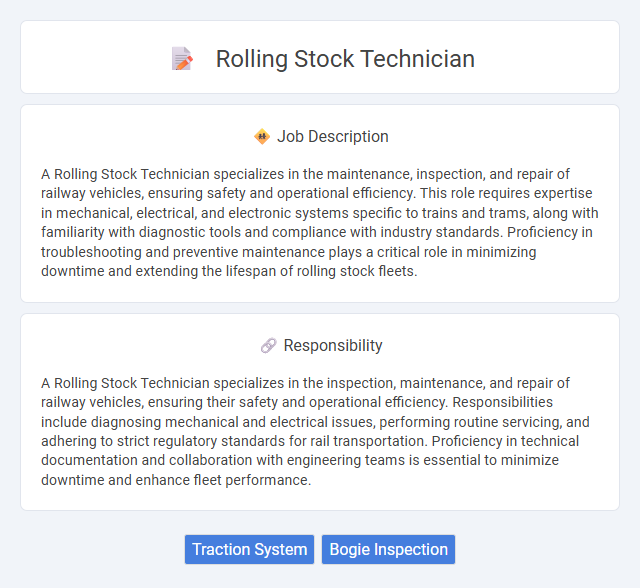
A Rolling Stock Technician specializes in the maintenance, inspection, and repair of railway vehicles, ensuring safety and operational efficiency. This role requires expertise in mechanical, electrical, and electronic systems specific to trains and trams, along with familiarity with diagnostic tools and compliance with industry standards. Proficiency in troubleshooting and preventive maintenance plays a critical role in minimizing downtime and extending the lifespan of rolling stock fleets.
Individuals with strong mechanical aptitude and attention to detail are likely to be well-suited for a Rolling Stock Technician role. Those with a preference for hands-on work and problem-solving in dynamic environments probably find this job fulfilling. Candidates with good physical stamina and the ability to work under pressure may experience higher success and job satisfaction in this field.
Qualification
Qualifications for a Rolling Stock Technician typically include a diploma or degree in mechanical or electrical engineering, combined with specialized training in rolling stock systems. Proficiency in diagnosing, maintaining, and repairing train components such as braking, traction, and signaling systems is essential. Industry certifications, hands-on experience with railway safety standards, and knowledge of diagnostic tools further enhance job readiness and performance.
Responsibility
A Rolling Stock Technician specializes in the inspection, maintenance, and repair of railway vehicles, ensuring their safety and operational efficiency. Responsibilities include diagnosing mechanical and electrical issues, performing routine servicing, and adhering to strict regulatory standards for rail transportation. Proficiency in technical documentation and collaboration with engineering teams is essential to minimize downtime and enhance fleet performance.
Benefit
A career as a Rolling Stock Technician likely offers competitive salaries and opportunities for growth in the rail industry. The role probably provides hands-on experience with advanced train systems, enhancing technical skills valuable for future positions. Access to employee benefits such as health insurance, retirement plans, and training programs may further contribute to job satisfaction and stability.
Challenge
Rolling Stock Technicians likely face complex diagnostic challenges when maintaining and repairing trains, requiring expert knowledge of mechanical, electrical, and electronic systems. The probability of encountering unexpected faults or system failures demands sharp problem-solving skills and quick adaptability. Constant technological advancements in rolling stock equipment may increase the difficulty of staying updated with the latest maintenance procedures and safety standards.
Career Advancement
Rolling Stock Technicians benefit from a clear career advancement path through gaining specialized certifications and hands-on experience with advanced rail systems. Progression often leads to senior technician roles, supervisory positions, or engineering support functions within rail maintenance organizations. Expertise in diagnostics and preventive maintenance technologies significantly enhances opportunities for leadership and higher salary brackets.
Key Terms
Traction System
Rolling Stock Technicians specializing in traction systems are responsible for the maintenance, troubleshooting, and repair of electric propulsion components in trains and trams. They work primarily with traction motors, inverters, and control units to ensure efficient power delivery and optimal performance of the rolling stock. Expertise in diagnostic tools and understanding of high-voltage safety protocols are essential for managing modern traction systems.
Bogie Inspection
A Rolling Stock Technician specializing in bogie inspection ensures the safety and reliability of train bogies by conducting detailed examinations of suspension systems, wheelsets, and brake components. Skilled in identifying wear, corrosion, and structural defects, they use advanced diagnostic tools to maintain compliance with safety standards and optimize performance. Accurate bogie assessments contribute to reducing downtime, preventing accidents, and extending the lifespan of rolling stock assets.
 kuljobs.com
kuljobs.com